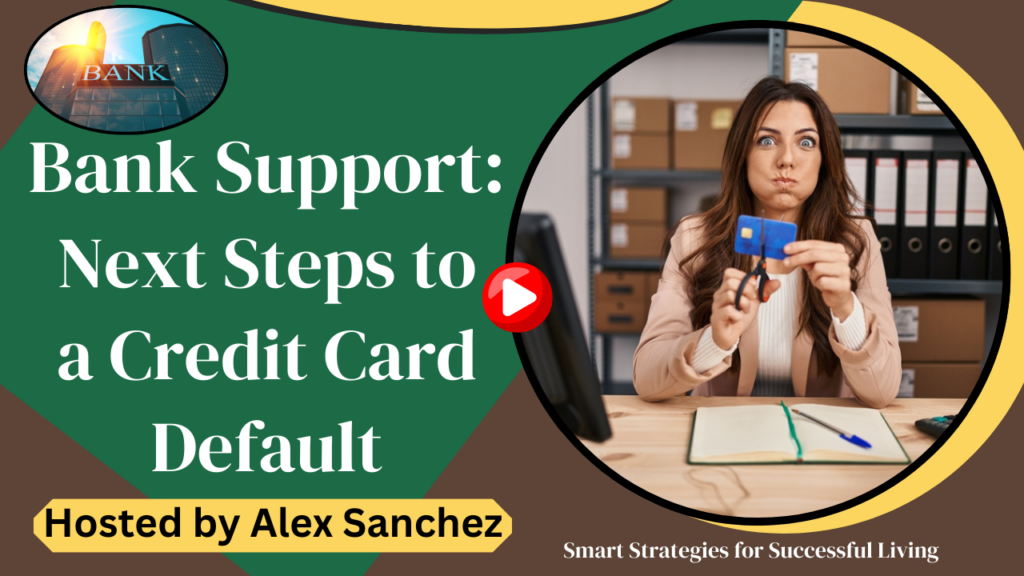Uncover the secrets to financial success in banking. Delve into the process of a credit card default, understand the role of community banks, and discover the guidelines for minors opening a checking account. Have a burning question about your banking needs? Contact our knowledgeable banking expert, Alex, at alexexpertbanker@gmail.com. Your inquiries will be featured on our website, receiving prompt and insightful responses from Alex.
Join us on the path to banking excellence and acquire the knowledge you need for financial fitness.
Question: My credit card closed because I wasn’t able to make my monthly payments. What happens next?
Asked by: Kaylee from Bakersfield, California.
Answer: When a payment on a credit card is not made for 180 days, the credit card issuer assumes that it will not be made at all. Consequently, the issuer usually closes the account, writes off the debt, and sells the account to a collection agency. The default will be reported to the three major credit bureaus (Experian, Equifax, and TransUnion). This will severely impact the borrower’s credit score, and the negative mark can remain on their credit report for up to seven years. There are four options available if a person defaults on their credit card. The first option is to do nothing. This is not recommended as it could result in a lawsuit by the debt collector. If they win, a judgment may be issued, and it could lead to the borrower’s wages being garnished. The second option is to pay off the debt. This is the best choice as it eliminates the collector’s pursuit of retrieving delinquent funds. If paying in full is not feasible, the third option is to settle the debt for less than the amount owed. If a settlement is reached, it is important for the borrower to get written confirmation of the agreement. The last option is for the borrower to declare bankruptcy. This drastic measure is used to handle overwhelming debt. It is advisable that an attorney be consulted before proceeding with the bankruptcy process. This involves court hearings and meetings with creditors. Bankruptcy can have long-lasting effects on a person’s credit score, so it should be considered as a last resort.
Question: What is a community bank?
Asked by: Antonio from Laredo, Texas.
Answer: A community bank is typically locally owned and operated. Defined by the FDIC as having less than $10 billion in assets, community banks prioritize personal customer service and cater to the individuals and businesses who live and operate in the areas they serve. They give back to the community by sponsoring events, offering financial education, and strongly encouraging their employees to volunteer their time at local nonprofit organizations. Compared to national banks, community banks are more likely to lend to small businesses. This is because lending decisions are made by underwriters who comprehend the economic realities of their communities.
Question: Can a minor get a checking account?
Asked by: Joshua from Minot, North Dakota.
Answer: Having a bank account can teach children about budgeting and financial responsibility, while ensuring safe transactions. Most experts recommend kids wait until they are at least 12-13 years old before introducing them to checking accounts. At this age, they typically show the maturity needed to understand money management. In a minor checking account, the minor is usually the primary account owner, and the parent/guardian is the co-owner. Both have equal access to deposits and withdrawals, and depending on the account, adults may supervise or limit the minor’s activities. For instance, they can cap withdrawals and receive spending notifications. As a co-owner, the parent/guardian shares the responsibilities of having a checking account, like ensuring it doesn’t go negative and paying bank fees. Monthly service charges are often waived, and minors can usually get a debit card in their name. The minimum age for a minor checking account varies depending on the financial institution. U.S. Bank, Chase, and Wells Fargo all offer checking accounts for kids aged 13 and older. Opening an account requires standard documentation for the minor, like a birth certificate and social security card.
 Written by: Alex Sanchez
Written by: Alex Sanchez
Important: For your specific questions about banking, contact your banking expert, Alex, at: alexexpertbanker@gmail.com
About our Author: With nearly 20 years of experience in the banking industry, Alex is currently a branch manager with First Interstate Bank. Throughout his career, he has contributed his expertise to renowned financial institutions like Bank of America, US Bank, and Chase. He also has a bachelor’s degree in Business Economics from the University of California, Riverside.
Discover More…
- Unlock the secret to a happier, healthier lifestyle by delving into additional captivating articles on our website at: Smart Strategies for Successful Living.
- Enjoy our uplifting and inspiring videos on our YouTube channel at: CLICK HERE.
- For more resources on Bank Support: CLICK HERE.
Check Out Our Captivating Videos
![]() About Smart Strategies for Successful Living: CLICK HERE.
About Smart Strategies for Successful Living: CLICK HERE.
![]() Your Journey of Self-Discovery: CLICK HERE.
Your Journey of Self-Discovery: CLICK HERE.
![]() Our YouTube Channel: CLICK HERE.
Our YouTube Channel: CLICK HERE.
Bank Support
![]() Next Steps to a Credit Card Default: CLICK HERE.
Next Steps to a Credit Card Default: CLICK HERE.
![]() Selecting A Bank That Works for You: CLICK HERE.
Selecting A Bank That Works for You: CLICK HERE.
![]() Safeguard Against Smishing: CLICK HERE.
Safeguard Against Smishing: CLICK HERE.
![]() Cash Advances on Credit Cards Are Costly: CLICK HERE.
Cash Advances on Credit Cards Are Costly: CLICK HERE.
![]() Keep Your Eye on the Prime Rate: CLICK HERE.
Keep Your Eye on the Prime Rate: CLICK HERE.









